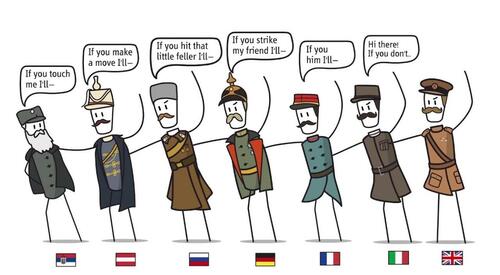
Anyone who has studied the history of the 20th Century is likely familiar with the tragic series of confluences and “coincidences” that triggered a domino effect of military alliances leading to WWI.
The tale of WWI is a tale of what DARPA would call a “linchpin” event – A relatively small action or crisis triggering a larger avalanche of geopolitical disasters.
One could even make the argument that the intricate chain of alliances in Eurasia were tailor made for world war, all that was needed was the right catalyst. This is how a war between tiny Serbia and Austria became a global conflict.
Unfortunately, a similar set of circumstances exists today in the Middle East, with many mainstream analysts finally realizing the dangers that alternative analysts have been warning about for years. The war between the Israelis and the Palestinians is not ultimately about terrorism or biblical disagreements, it is about a structure of defense pacts and alliances that are just waiting to be tested.
The situation is rooted in archaic tribal disagreements that date back thousands of years, to be sure. Both sides think they are the “chosen people” anointed by heaven, which is why western nations have no business getting involved. It's a mess that the west can only make worse. That said, this ancient division is merely a useful “linchpin” that can be exploited by malicious parties to ignite a global disaster.
The two keys to the spreading conflict are Israel and Iran (not the Palestinians).
Iran has been mentioned in numerous press discussions by US and Israeli officials as a primary influence behind the Hamas attacks on Israeli settlements on October 7, though no concrete evidence or intel has yet been provided.
There are a number of defense agreements involving these two countries that create a potential chain reaction for greater war.
Most people are familiar with the alliance between Israel and the US, but few understand the importance of Iran's many defense connections...
Iran And Lebanon
The relationship between Iran and Lebanon is a subject of extensive debate, but the consensus in the strategic analysis community is that Iran runs Lebanon from behind the curtain. The real situation is a bit more complicated. There are multiple factions within Lebanon vying for power over the national government in the wake of a presidential vacuum, and there has been talk of a possible civil war.
Both Iran and China have been engaged in diplomatic efforts to ease tensions in the region. China recently brokered an agreement between Iran and Saudi Arabia which was expected to deescalate a number of issues in the Middle East, and this was supposed to have a trickle down effect in Lebanon. Iran has also stepped in on a number of occasions to mediate disagreements within Lebanon in an effort to secure an election. The Israeli/Palestinian war may have just thrown all of these plans into disarray, or, they might expedite agreements and force consolidation.
What is not in question is Iran's military relationship with Lebanon. If Lebanon and Hezbollah enter into a war with Israel they will receive extensive support from Iran, if not direct military intervention.
Iran And Syria
Iran and Syria signed a mutual defense agreement in 2006. There are questions as to how this alliance would develop in light of the US troop presence within Syria's borders, but that would require us to know why the US government placed those troops there to begin with. It certainly wasn't to fight “ISIS.” So far, Iran appears to be maintaining a proxy position, using groups they fund and train to operate covertly in the area but never openly laying claim to anything.
This could very well change if the war in Israel escalates. There has been a number of attacks on US bases and personnel in Syria in the past two weeks, which is why there is now a rush to place missile defense batteries before Israel commits to a ground invasion of Gaza. If Iran enters the war, Syria's involvement is assured.
Iran And Yemen
It is well known that the Houthi rebels in Yeman have been receiving a steady supply of armaments from Iran in their battles with Saudi Arabia. The agreement brokered by China was ostensibly meant to halt this and open a dialogue between Iran and the Saudis. That said, Iran and the militant groups in Yemen have close ties. Yemen would certainly involve itself in a war between Iran and the west.
Iran And Russia And China
In July of this year Iran officially joined the Shanghai Cooperation Organization (SCO), becoming the ninth member of the Chinese led economic and security block which also includes Russia. The three countries are now being referred to as the “Triangular Alliance” which is specifically designed to weaken US and NATO global influence.
China has begun by beefing up Iran's economy through investment and oil purchases in the face of western sanctions. Russia has been restocking its military armaments with purchases of artillery shells and drones from Iran. The Biden Administration argues that Russia and Iran have entered into “unprecedented military ties,” but the truth is that there was no opportunity to test those ties until now.
It is hard to say how far Russia and China would be willing to go to help Iran should the US and Israel venture into open conflict with them. Most likely they would first use economic retaliation, with China dropping the dollar as the world reserve currency in bilateral trade. With so many economic and military interests linked to the Middle East, any broad conflict would inevitably drag multiple nations into the fray. This is probably why Vladimir Putin warned in 2019 that any US led war with Iran would result in 'sad consequences and catastrophe.'
Anyone who has studied the history of the 20th Century is likely familiar with the tragic series of confluences and “coincidences” that triggered a domino effect of military alliances leading to WWI.
The tale of WWI is a tale of what DARPA would call a “linchpin” event – A relatively small action or crisis triggering a larger avalanche of geopolitical disasters.
One could even make the argument that the intricate chain of alliances in Eurasia were tailor made for world war, all that was needed was the right catalyst. This is how a war between tiny Serbia and Austria became a global conflict.
Unfortunately, a similar set of circumstances exists today in the Middle East, with many mainstream analysts finally realizing the dangers that alternative analysts have been warning about for years. The war between the Israelis and the Palestinians is not ultimately about terrorism or biblical disagreements, it is about a structure of defense pacts and alliances that are just waiting to be tested.
The situation is rooted in archaic tribal disagreements that date back thousands of years, to be sure. Both sides think they are the “chosen people” anointed by heaven, which is why western nations have no business getting involved. It’s a mess that the west can only make worse. That said, this ancient division is merely a useful “linchpin” that can be exploited by malicious parties to ignite a global disaster.
The two keys to the spreading conflict are Israel and Iran (not the Palestinians).
Iran has been mentioned in numerous press discussions by US and Israeli officials as a primary influence behind the Hamas attacks on Israeli settlements on October 7, though no concrete evidence or intel has yet been provided.
There are a number of defense agreements involving these two countries that create a potential chain reaction for greater war.
Most people are familiar with the alliance between Israel and the US, but few understand the importance of Iran’s many defense connections…
Iran And Lebanon
The relationship between Iran and Lebanon is a subject of extensive debate, but the consensus in the strategic analysis community is that Iran runs Lebanon from behind the curtain. The real situation is a bit more complicated. There are multiple factions within Lebanon vying for power over the national government in the wake of a presidential vacuum, and there has been talk of a possible civil war.
Both Iran and China have been engaged in diplomatic efforts to ease tensions in the region. China recently brokered an agreement between Iran and Saudi Arabia which was expected to deescalate a number of issues in the Middle East, and this was supposed to have a trickle down effect in Lebanon. Iran has also stepped in on a number of occasions to mediate disagreements within Lebanon in an effort to secure an election. The Israeli/Palestinian war may have just thrown all of these plans into disarray, or, they might expedite agreements and force consolidation.
What is not in question is Iran’s military relationship with Lebanon. If Lebanon and Hezbollah enter into a war with Israel they will receive extensive support from Iran, if not direct military intervention.
Iran And Syria
Iran and Syria signed a mutual defense agreement in 2006. There are questions as to how this alliance would develop in light of the US troop presence within Syria’s borders, but that would require us to know why the US government placed those troops there to begin with. It certainly wasn’t to fight “ISIS.” So far, Iran appears to be maintaining a proxy position, using groups they fund and train to operate covertly in the area but never openly laying claim to anything.
This could very well change if the war in Israel escalates. There has been a number of attacks on US bases and personnel in Syria in the past two weeks, which is why there is now a rush to place missile defense batteries before Israel commits to a ground invasion of Gaza. If Iran enters the war, Syria’s involvement is assured.
Iran And Yemen
It is well known that the Houthi rebels in Yeman have been receiving a steady supply of armaments from Iran in their battles with Saudi Arabia. The agreement brokered by China was ostensibly meant to halt this and open a dialogue between Iran and the Saudis. That said, Iran and the militant groups in Yemen have close ties. Yemen would certainly involve itself in a war between Iran and the west.
Iran And Russia And China
In July of this year Iran officially joined the Shanghai Cooperation Organization (SCO), becoming the ninth member of the Chinese led economic and security block which also includes Russia. The three countries are now being referred to as the “Triangular Alliance” which is specifically designed to weaken US and NATO global influence.
China has begun by beefing up Iran’s economy through investment and oil purchases in the face of western sanctions. Russia has been restocking its military armaments with purchases of artillery shells and drones from Iran. The Biden Administration argues that Russia and Iran have entered into “unprecedented military ties,” but the truth is that there was no opportunity to test those ties until now.
It is hard to say how far Russia and China would be willing to go to help Iran should the US and Israel venture into open conflict with them. Most likely they would first use economic retaliation, with China dropping the dollar as the world reserve currency in bilateral trade. With so many economic and military interests linked to the Middle East, any broad conflict would inevitably drag multiple nations into the fray. This is probably why Vladimir Putin warned in 2019 that any US led war with Iran would result in ‘sad consequences and catastrophe.’
Loading…





